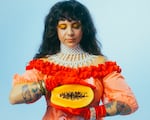For over a decade, Isabeau Waiaʻu Walker worked in education while moonlighting as a musician. Although Waiaʻu Walker dreamed of playing music full-time, she insists that teaching wasn’t just a day job.
“I meant to be a teacher,” says Waiaʻu Walker, who was raised in Hawaii but lives in Oregon City, Oregon. “I didn’t go into the profession as like a first step to launch me into music. I didn’t go into it just because there was some semblance of stability and the schedule and the pay and the expectations. I really meant to be with the students and the families in that space.”
Despite that passion for teaching, the dream eventually won out three years ago when she decided to quit her job at Canby High School in order to pursue a career in music.
Her timing wasn’t great.
The pandemic upended the music industry and prevented Waiaʻu Walker from playing live music, a devastating blow for a fledgling artist. Undeterred, she continued to write and her “worthwhile risk,” as she calls her decision to change careers, paid off this month with a debut album called “Body” (due out on May 15).

"Body" album cover by Isabeau Waiaʻu Walker
Cooper U. Pattison
The new album’s 12 songs explore the dramatic change she’s undergone, as well as some of the shared traumas we’ve all experienced during the pandemic. But Waiaʻu Walker’s reconnection with her Hawaiian heritage is perhaps the most striking theme on the record. “Body” even features several songs with lyrics sung in the Hawaiian language, including the album’s stunning closer “The Prince” which tells a deeply personal family history.
Singing in Hawaiian is a relatively new part of Waiaʻu Walker’s repertoire. In the late 1800s, the language was outlawed in the Hawaiian Islands and that ban was only officially lifted in 1986. Because of that, the language almost died out. Waiaʻu Walker says it wasn’t spoken in her childhood home and her father was discouraged from learning it.
“My dad had to work through his own relationship with the language because he had been taught for so long that the only way that the world would take you seriously and you could survive as you had to not [use the language],” says Waiaʻu Walker.
In recent years, attitudes have shifted and opportunities to learn the language have expanded. That extends to Waiaʻu Walker’s family and her art.
“Honestly, the more my dad has found healing in connection [with the language], it’s been like a ripple effect in our family,” she says.
Read her interview with OPB below.
Jerad Walker: You’ve got a really interesting background. You were a school teacher for many years and left that profession in 2019 to pursue music full-time. I imagine that transition was a big influence on this body of work.
Isabeau Waiaʻu Walker: That was a huge shift, not just because it was a different career choice and the risks involved in that, but because I meant to be a teacher, I didn’t go into the profession as like a first step to launch me into music. I didn’t go into it just because there was some semblance of stability and the schedule and the pay and the expectations. I really meant to be with the students and the families in that space.
And so this relinquishing of titles, relinquishing of security and even just who I thought I was as a teacher to enter into this new space — it feels really exciting. But honestly, it felt like I definitely turned my life inside out quite a bit on purpose. But then it was a really worthwhile risk.
JW: The timing had to have been difficult with the pandemic, though.
IWW: Yeah. Well, a lot of people who hear that I was a teacher are like, “Oh, you left because of the way the [post-pandemic] world changed education and teaching. That must have been tough.” And I always have to come back with “No, I left right before COVID.”
JW: Well, in a strange way, it’s kind of tough to figure out which profession got hit harder. Education or music.
IWW: Yeah, I have friends who are still teachers and when I hear about the stress and strain on them, the stress and strain that they’re witnessing their student … I don’t know which one got hit worse, but I ping pong between despair and gratitude. [laughter]
JW: You live in Oregon City but grew up in Hawaii and have Pacific Islander heritage. How does that island background influence your music?
IWW: I think it shows up the most in the who and what of what I’m writing about. But probably upon first listen, to face value, I don’t know if people will catch that stuff.
JW: I feel like your song “Rolled Over” jumps out at the listener with regards to that. It seems like you’re exploring the push and pull between two different identities. There’s a striking lyric in there that says “You’ll hear oceans speak in speckled shells but frozen amongst the roots of evergreens.”
IWW: That song is exactly about the push and pull and I’ve actually found a steadiness, even though those things aren’t resolved, somehow in that middle, the back and forth. I feel the most understood [in that place].

Isabeau Waiaʻu Walker
Cooper U. Pattison
JW: You also sing in the Hawaiian language [ʻŌlelo Hawaiʻi] on some of the songs that come later in the album. Was the Hawaiian language part of your upbringing and what’s the cultural significance there?
IWW: For me, that’s a very big deal because the native Hawaiian language was forbidden for so long. The generation that my dad grew up in — he heard it primarily at home or, for him, in the church. That’s one way that a lot of Hawaiians kept the languages, that they would just translate hymns and scripture. And because it was within the confines of the church, it was a proper sneaky way of just keeping it around it. But it’s stuck around in story in song form. And my dad had to work through his own relationship with the language because he had been taught for so long that the only way that the world would take you seriously and you could survive as you had to not [use the language].
Honestly, the more my dad has found healing in connection [with the language], it’s been like a ripple effect in our family.
JW: Your album closes with a stunning song called “The Prince,” which seems like a pretty direct nod to your heritage. Can you tell me about that song?
IWW: Yeah. So “The Prince” is a song that I wrote for my dad. It came from a story that my dad told me. When he was three, he lost his father in a drunk driving accident and that moment is kind of, for our family, the shattering point.
And some of the money from the [accident] settlement allowed my Grandma Hawea to send him to a really nice boarding school on the Big Island. My dad, to this day, will say academically that was a great privilege. But on every other front those were some of the worst years of his life. He was just the odd man out there completely — racially, culturally, even though it was in Hawaii, and definitely socio-economically.
So fast forward all the way to the end of his high school career in Hawaii. There are big high school graduations [every year on the islands]. Everyone gets covered in leis and families come out. It’s a big deal. He invited his mom, my grandma, his brothers, my uncles and then Auntie I’o [who was very well-respected in the community]. And he has this memory of the big high school graduation. Everyone is getting their lei and talking to their family members and he sees Auntie I’o approaching him. And the school chaplain, who had just given him so much hell since he was 12, he’s never felt that he belonged to these people. So this chaplain steps in front and tries to intercept Auntie I’o and do the chit-chat, let’s network and connect to someone who is well-known in the community [kind of thing]. And Auntie I’o said, “I’m here for Kaleo.” My dad’s name is Kaleo. And she proceeded to step past the chaplain and walk on to my dad.
And my dad, [who was telling me this story while] sitting on the edge of my bed was like, “I felt like a prince — to be seen, especially in that crowd, as her most important.”
So that song comes from that. And the hymn, the ʻŌlelo Hawaiʻi, the Hawaiian portions in the song are not my direct lyrics. It’s an old hymn. Even though it seems to run contrast to the themes of colonialism in the verses, for me, it’s where the language was held and kept and allowed me to have access to it. And it held my family together. So even though it came through the church that did bring a lot of hurt, it was also a place where we were bonded together and safe. Yeah, the song “The Prince” is for my dad, but it’s definitely for all the kids back home.

